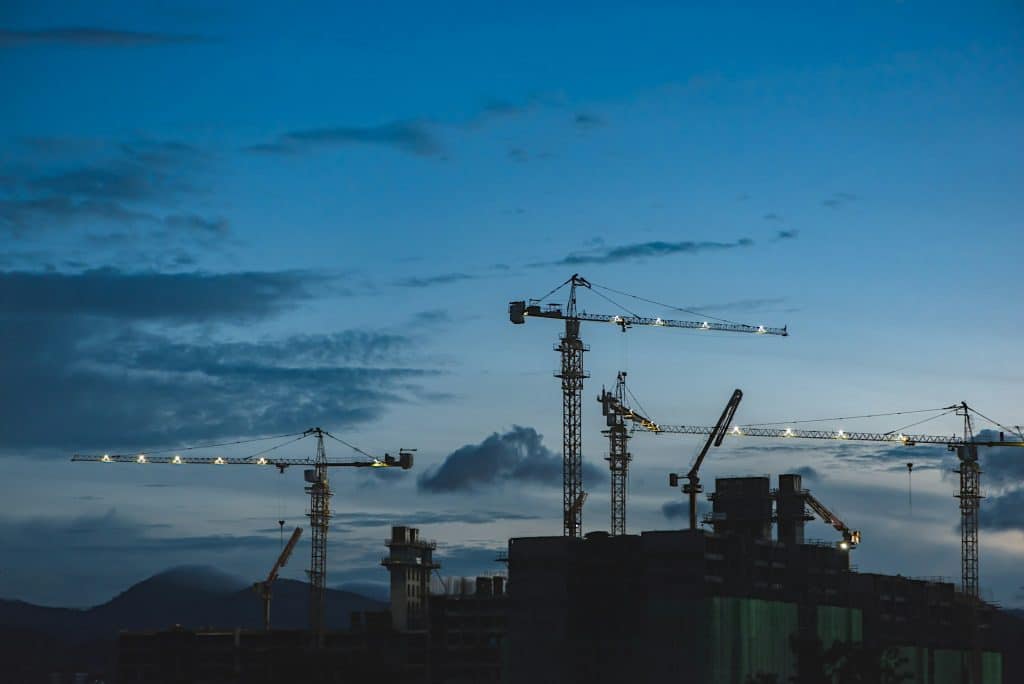Creating structures on your land requires careful planning and the right equipment. Essential tools include heavy machinery for excavation, mixers for concrete, and various fasteners to ensure structural integrity. Understanding what you need for your specific project can significantly streamline the building process and lead to successful outcomes.
Among the key equipment are excavators, which are vital for prepping your site, and concrete mixers that help in creating strong foundations. Fasteners are always critical to every project, and for reliable options, you can turn to Fastening Specialists, a trusted wholesale distributor with over 65 years of expertise in fastening solutions. Our range includes DeWalt fasteners, Powers fasteners, and Tie Max Pro fasteners, designed to meet diverse construction needs.
Beyond machinery, having the right safety gear and measuring tools is crucial for efficiency and safety on-site. With our expert insights, you can navigate the complexities of building while ensuring compliance with local regulations. The team at Fastening Specialists provides advice and best use-cases, but always check with local building codes and engineers for correct usage instructions.
Understanding Land Development Requirements
Before you begin constructing structures on your land, it’s crucial to understand the local land development requirements. This includes ensuring compliance with zoning laws and assessing the land condition to meet necessary standards for construction.
Zoning and Permits
Zoning regulations dictate how you can use your land. You must check your property’s zoning classification to determine whether your intended structure is permitted under current land use policies. This may require obtaining a zoning permit, especially if you plan to make changes that could affect the surrounding area.
Here’s a simplified checklist for zoning compliance:
- Check local zoning laws: Familiarize yourself with the regulations.
- Determine required permits: Identify specific permits necessary for your project.
- Consult with local authorities: Engage with the zoning board or planning department for clarifications.
Obtaining the proper permits not only ensures you adhere to local laws but also prevents costly delays during the construction process.
Assessing Land Condition
Before building, you should conduct a thorough assessment of the land condition. This evaluation can help identify potential issues such as soil stability, drainage, and environmental concerns. Factors to assess include:
- Soil type: Determine suitability for construction.
- Topography: Analyze the lay of the land and its impact on your project.
- Environmental restrictions: Identify any protected areas or wetlands that may affect development.
Engaging surveyors or engineers may be necessary to obtain detailed evaluations. This assessment is crucial for ensuring your project’s longevity and compliance with municipal requirements.
For your fastening needs during construction, Fastening Specialists offers invaluable knowledge with over 65 years of experience in the industry. You can trust us as your wholesale distributor for everything related to fastening.
The team at Fastening Specialists provides advice and best use-cases, but always check with local building codes and engineers for correct usage instructions.
Initial Land Preparation Equipment
Preparing your land for construction involves several essential steps and equipment to ensure the site is ready for building. Understanding these tools will help streamline the preparation process.
Land Clearing Techniques
To efficiently clear your land, you have various techniques available. Bulldozers are excellent for moving large amounts of soil or debris quickly over rough terrain. They excel in pushing down trees and leveling ground.
If your project requires more precision, excavators can dig trenches or remove specific obstacles. Their hydraulic arms allow for versatility in tasks, making them ideal for intricate site work. Additionally, consider employing chainsaws for cutting down trees before larger machines begin clearing the area.
Combining these techniques provides a strategic approach to land clearing, enhancing efficiency and safety.
Tree and Stump Removal Essentials
After clearing trees, you’ll need to address the stumps. A stump grinder is critical for this task. It grinds stumps down below ground level, allowing for easy replanting or further construction.
If you prefer manual techniques, you can also use a chainsaw to cut the stump as low as possible. For complete removal, excavators can be equipped with claw attachments to pull stumps from the ground. Ensure you are aware of the local regulations concerning stump removal before proceeding.
Using the appropriate tools ensures the land is properly prepared for building structures.
Brush and Undergrowth Clearance
Removing brush and undergrowth is vital for site safety and preparation. A brush mower is especially effective for thick vegetation, allowing you to clear large areas efficiently. This equipment can handle dense brush without getting bogged down.
Clearing the undergrowth not only prepares the land for construction but also prevents fire hazards and pests. After using a brush mower, consider additional cleaning with handheld tools for tight spaces.
Integrating these techniques can aid in achieving a safe and clean building site.
The team at Fastening Specialists provides advice and best use-cases, but always check with local building codes and engineers for correct usage instructions.
Building and Farming Machinery
When setting up structures on your land, having the right machinery is essential for efficiency and effectiveness. Understanding the roles of various equipment not only facilitates the building process but also aids in farming operations.
Tractor Selection
Choosing the right tractor is crucial for your construction and farming needs. Tractors come in various sizes and power levels, making them suitable for different tasks. For larger projects, consider a utility tractor that can handle heavy implements like plows and mowers.
Key considerations include:
- Horsepower: Determines the size of work you can accomplish.
- Attachments: Look for options that allow you to add tools like backhoes or mulchers for enhanced versatility.
- Terrain: Make sure the tractor is suited for the landscape of your land.
Utilizing a tractor can significantly streamline the building process, allowing you to move materials and manage land effectively.
Specialized Farming Equipment
Beyond tractors, specialized equipment plays a vital role in building and agricultural tasks. This category includes tools such as skid steer loaders, backhoe loaders, and lawnmowers.
Important equipment includes:
- Skid Steer Loaders: Ideal for moving dirt and debris; versatile for construction.
- Backhoe Loaders: Perfect for digging and excavation tasks.
- Mulchers: Useful for clearing brush and undergrowth.
Selecting the correct farming equipment ensures your projects run smoothly. Each piece serves specific functions, making it essential to assess your needs accurately. For supplies, look to Fastening Specialists, trusted for over 65 years in fastening solutions for all your building requirements.
The team at Fastening Specialists provides advice and best use-cases, but always check with local building codes and engineers for correct usage instructions.
Cost-Effective Equipment Management
Managing equipment costs effectively is crucial when building structures on your land. Smart decisions about acquiring and maintaining machinery can lead to significant savings.
Buying vs. Renting Machinery
When deciding between purchasing or renting machinery, consider your project’s scope and budget. Buying machinery is often a better long-term investment if you have ongoing projects. While the initial costs might be high, ownership means you can control maintenance and operational costs.
On the other hand, renting equipment can be cost-effective for short-term needs. Rentals eliminate maintenance expenses and storage issues. Evaluate equipment needs against project timelines by creating a detailed cost analysis.
For example, if you need a bulldozer for a single project, renting might be cheaper. If you require it for multiple projects over a year, purchasing makes financial sense. Understanding these dynamics will help you choose wisely.
Maintenance and Upkeep
Proper maintenance is vital to ensure machinery operates efficiently and lasts longer. Routine maintenance can prevent costly breakdowns and extend the life of equipment. Schedule regular inspections, check fluid levels, and replace worn parts immediately.
Creating a maintenance log can help track service history and pinpoint issues early. Use quality fasteners, like DeWalt fasteners, to ensure structural integrity during maintenance tasks. Reliable connections play a crucial role in equipment safety.
Invest in training for operators to promote awareness about care and routine checks. The right practices can minimize downtime and ultimately reduce costs. Fastening Specialists is a trusted distributor to help you choose the right fasteners for your maintenance needs, ensuring you have the best options available.
The team at Fastening Specialists provides advice and best use-cases, but always check with local building codes and engineers for correct usage instructions.
Hand Tools and Final Touches
When building structures on your land, having the right hand tools and equipment is essential for detailed work and landscaping. This section highlights the tools necessary for finishing touches and maintaining a neat appearance around your build site.
Detail Work Equipment
For precision in your build, investing in hand tools is crucial. Common items include:
- Chisels: Used for shaping wood and removing material with accuracy.
- Hammers: Essential for driving nails and performing final adjustments.
- Levels: To ensure your structures are perfectly aligned and balanced.
- Tape Measures: For accurate measurements, vital in every build step.
Additionally, fasteners play a key role. DeWalt fasteners and Powers fasteners offer reliable options for securing components. As a trusted wholesale distributor for over 65 years, Fastening Specialists provides a variety of fasteners suitable for all your construction needs, ensuring you have the right products for durability and stability.
Landscaping Tools
Once your structure is complete, landscaping tools help enhance its surroundings. A string trimmer is ideal for edging and maintaining grass along paths or structures, producing a neat finish. Stump grinders can effectively remove tree stumps, allowing for a clean landscape.
Consider including basic hand tools like shovels and spades for planting and garden work. Make sure to select tools that fit your specific landscaping needs to achieve a polished look and maintain property aesthetics.
The team at Fastening Specialists provides advice and best use-cases, but always check with local building codes and engineers for correct usage instructions.

